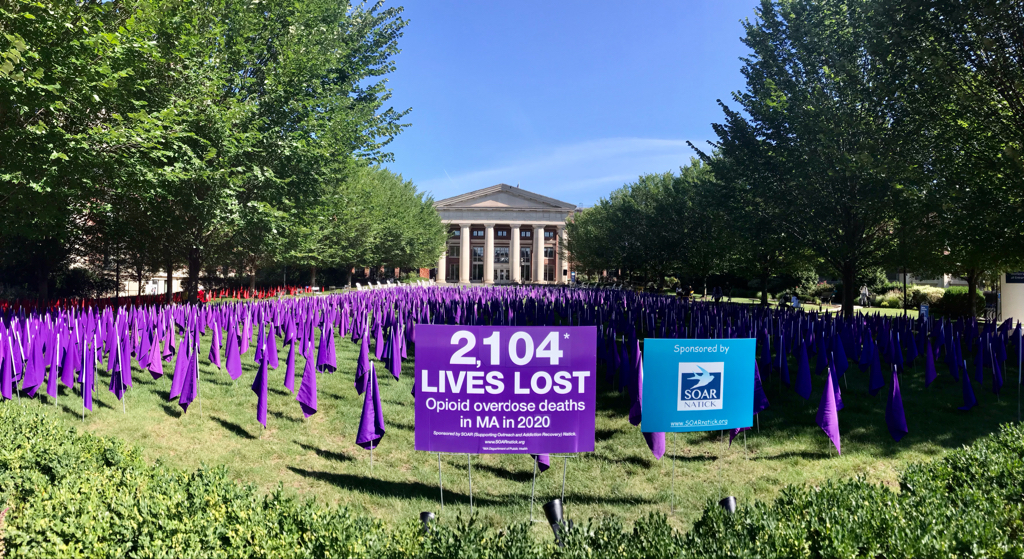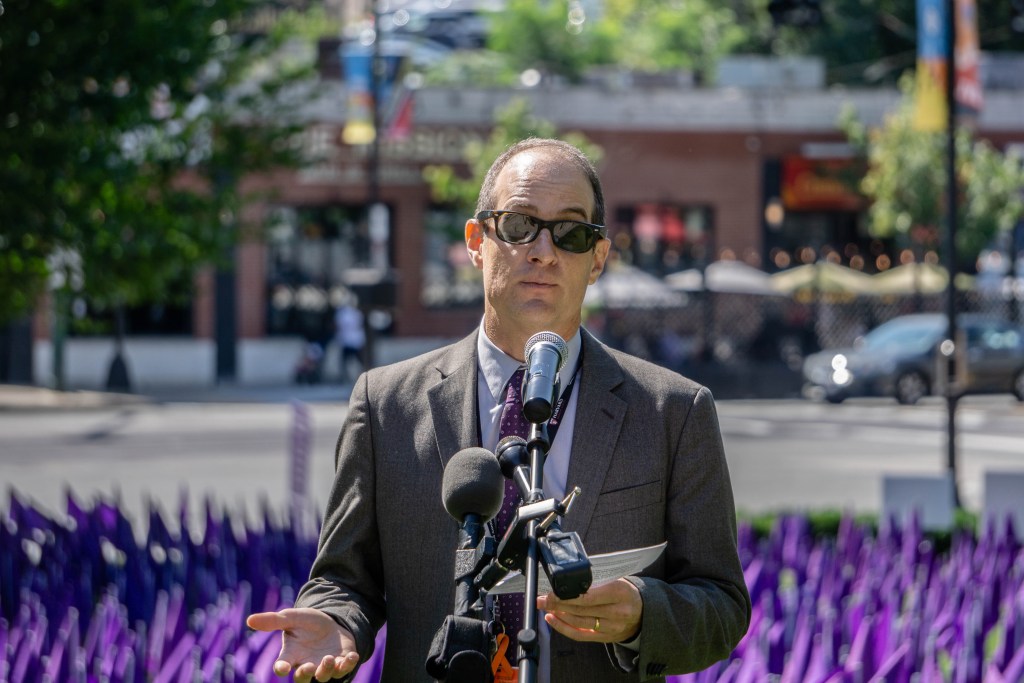Recovery Month Exhibit Offers a ‘Somber Reminder of Tragedy and Hope’

Approximately 2,100 purple flags adorn the lawn in Stoneman Centennial Park, each one symbolizing a life lost to an opioid overdose in Massachusetts in 2020.
Some details in this story have been changed to protect patient confidentiality.
When an ambulance arrived outside the Brigham’s Emergency Department (ED) during a night shift, emergency physician Scott Weiner, MD, MPH, found a young patient inside who was unresponsive and whose heart had stopped beating.
“My colleagues and I worked for over two hours to try and save the patient, but were unsuccessful, and we lost them,” Weiner said. “When I told the family this tragic news and asked what happened, they explained the patient had relapsed and was using fentanyl.”
Fentanyl is a synthetic opioid that is 80 to 100 times stronger than morphine, according to the U.S. Drug Enforcement Administration. It accounted for over 80 percent of the opioid-related deaths in the country last year, according for the Centers for Disease Control and Prevention.
Weiner, who also serves as director of the Brigham Comprehensive Opioid Response and Education (B-CORE) Program, shared this story with colleagues and others during an event on Sept. 14 in Stoneman Centennial Park at 15 Francis St. to pay tribute to those who have lost their life to an opioid overdose, raise awareness about the services available across the Brigham family for those in need and recognize September as Recovery Month.
“We are sadly in the age of a syndemic, in which two epidemics are concurrently affecting the same population — COVID-19 and substance use disorder,” explained Weiner. “In addition to the lives lost from COVID-19, there were over 93,000 lives lost to overdose in this country, including over 2,100 lives lost to opioid overdose in Massachusetts.”
The Brigham now has a comprehensive approach to caring for patients with opioid use disorder, with programs targeted at prevention, treatment and innovation. That work needed to start with the acknowledgement, however, that patients’ first exposure to opioids often came from prescribers, said Sunny Eappen, MD, MBA, interim Brigham president and chief medical officer.
“Once we make the decision to prescribe opioids, we have a very systematic plan in place where we not only try to minimize the dose of the opioid but also the number of pills we give out,” Eappen said.
This led to the launch of the Brigham Bridge Clinic, which has been providing timely care for patients with opioid use disorder and other substance use disorders, while also inspiring innovation to combat the region’s opioid crisis since opening in 2018.

Scott Weiner speaks during the ceremony.
As Eappen, Weiner and others spoke to the crowd, a field of purple flags — 2,104 to be exact — created a colorful, yet mournful backdrop at Stoneman. Each flag planted in the grass at the park represents a person who lost their life to an opioid overdose in Massachusetts in 2020. Red flags are also planted at the site and represent lives lost in any year to substance use. The nonprofit organization Supporting Outreach & Addiction Recovery (SOAR) Natick sponsors the Purple Flag Project in local cities and towns each September.
“Although this exhibit is a somber reminder of tragedy, I also want it to be one of hope,” Weiner said. “We need an all-hands-on-deck approach to substance use disorder to ensure it is recognized as a disease in which we provide easy access to evidence-based treatment and in which we don’t stigmatize this disease because it is not a choice nor any individual’s fault. We must also share stories of success as well, to remind people that recovery is possible.”
‘Our Voices Matter’
Pablo Gonzalez, a recovery coach at the Brigham who is in long-term recovery himself, spoke at the event about the work he does to support and guide participants toward hope and recovery.
“Hope is the most important thing you can offer a person who is still using,” Gonzalez said. “What I love about my job is that I get to share my story with another human being who is suffering just like I was, and I get to see some of them get and stay substance free. That is the best feeling. Our voices matter — using our experience to promote recovery.”
Lisa Keefe, RN, co-chair of SOAR Natick and a staff nurse at Newton-Wellesley Hospital, said she was humbled to be a part of honoring someone’s life in such a “unique and powerful way” through the Purple Flag project. She hopes the display helps raise awareness about the enormity of the opioid epidemic.
Both grateful for the collaboration between SOAR and the Brigham, Keefe and Weiner are optimistic that the display will help break down barriers of stigma and shame attached to the disease.
“During National Recovery Month, we honor and remember those who we have lost, but also share hope that one year, hopefully soon, we won’t need to plant any more flags,” Weiner said.
The flags are on display at Stoneman through Sept. 25. To view the recording of the Sept. 14 ceremony, click here.
For more information about recovery month, and to view a calendar of events, visit The Pulse.

Leave a Reply